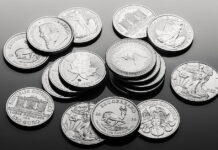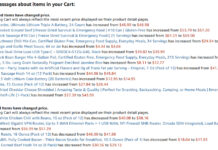I don’t have a lot, but with me that’s fine
Whatever I got, well, I know it’s mine
—Lyrics from Neil Diamond’s
The Boat that I Row
Do You Own your Stuff, or does it Own You?
I’m not much of Neil Diamond fan, but my wife is, so I heard this song the other day while we were driving around. That opening line caught my attention because I can relate.
In an era when people put their groceries on a credit card and finance their Uber Eats order over four months, how many people can say, “Whatever I got, well, I know it’s mine.” Not too many. Not if you use buy-now-pay-later services, or carry a credit card balance, a mortgage, or a car loan.
I think we are entering into a period of economic uncertainty when it will be important to own things.
Ownership Equals Economic Safety and Certainty
For example, if you own your car and house outright, no bank can take them from you. If you have a mortgage or rent, the bank or your landlord won’t care if you get laid off in a recession. They’ll back that wrecker up and yank your car out of your driveway like a child grabbing a cooking off the kitchen counter. Miss a few rent payments, and an eviction notice will show up on your door and the sheriff will lock you out of your own home. Things you own cannot be repossessed or foreclosed.
They can be confiscated, however, so pay your taxes. If you own gold or bitcoin, keep your mouth shut. The government can’t confiscate it or tax it if they don’t know you have it. Pay cash when possible, and don’t keep your precious metals in a safe deposit box. Don’t talk about it and don’t trade it. Like Gandalf said, “Keep it secret. Keep it safe.” It will be your economic security blanket.
Mayhem and Chaos
We seem to be on the cusp of financial mayhem and chaos, some supply chain disruption, and possibly a war or two. Having little or no debt should help you survive whatever happens, and I say “whatever” because it is pretty darn hard to predict what will happen.
Will there be a recession? Inflation? Stagflation? Or will Trump’s policies lead us to a period of growth and expansion? Are housing prices going up or coming down? What is consumer sentiment doing? Will there be peace in Ukraine, or with Iran? Ask ten economists what’s going to happen, and you’ll get 12 different answers.
Disruption remains my watch word for 2025. We are still in the early stages of the year of disruption. No one can tell you what is going to happen. We have to wait and see. The prepping supplies and other resources you own will help cushion the blow, if there is one.
Recession or Expansion?
Charles Hugh Smith says we are in “The Wile E. Coyote recession.” He explains that this is the lag time between when the Coyote runs off the cliff and the moment he realizes he is in midair and plummets to the ground. In other words, the economy has already run off the cliff, but we haven’t realized it yet. Is that true? I don’t know, but it is as reasonable a hypothesis as anything else I’ve heard.
During the Wile E. Coyote recession, you want to be the road runner, not the coyote. The road runner escapes the coyote recession, and so can you, if you stay employed and are not deeply in debt. Beep Beep!
My best guess is we will face some kind of recession, but it will end quickly. Just like the cartoon coyote, the market will be back with a rocket boosting it skyward. In the long run, I think the Trump policies will benefit the country, reduce the deficit, and slow, if not reverse, the downward spiral. It’s the journey to that end point that might be rough. If he can get a tax bill passed that has no taxes on tips, social security or overtime, that should help multiple segments of society and offset some of what (we hope) will be temporary economic pain.
Money is Freedom
Back in the 1990s, I felt trapped in my job. I knew how much money I produced for my employer, and I saw how little they paid me. Then, one day, I got an offer from a competitor and jumped on it. I got brought in at a supervisory position and they started me off at about 30 percent more than I had been making. That was when my credit card bills got smaller every month until they were paid off. It was also the time when freedom drew closer.
Many years later, I reached a point where I had what is called “walk-away money” or sometimes “F-U money.” That is when you are in a financial position such that your salary no longer pins you to your job. Sure, having the income is nice, but not so nice you can’t walk away from it if you don’t like how the organization is being run or if they ask you to do something with which you disagree. That, my friends, is freedom. It allows you to be less beholden to those who employ you. It makes you the guy who can be honest and who can say, “F-U, I’m not doing that.” So what if they fire you? You got money, experience, and contacts. In effect, you are bullet proof. I think it makes you a better employee, too.
The Secret to Financial Success
How can you get to that point? The secret isn’t to make a lot of money. The secret is to live on a less than you make. Then you can pay off your debts, your car, and your mortgage. By lowering your monthly payments, you will have an even greater surplus, which you can save, invest, or use to buy more assets.
In a topsy-turvy market, having assets and a steady income gives you freedom. Being self-sufficient will help you do that. Paying off your mortgage and owning your car will help you become financially bulletproof. Because when they can’t be repossess your car or home, and you have money in the bank and a year’s worth of food in your prepper pantry, you have the equivalent of F-U money.
Preparedness is a lifestyle. So is living within your means. I encourage you to do both because they complement each other. Knowing whatever you got is yours will help you be better prepared for an economic collapse or de-dollarization.
It’s Not Easy
Right now, some of you doubt you can ever do that.
I get it. It’s difficult living on less than you make. Getting debt free seems impossible, especially when prices are rising. Something always comes up, demanding more money. If you have kids, it’s even tougher. Just remember, kids won’t miss what they never had, especially when they are young.
What makes living under your means—instead of beyond them—tough is society’s expectations. Your peers, your parents, and your colleagues won’t understand why you drive an old beater and live in a small home when you don’t have to. That’s OK, in 25 years, they won’t understand how you retired early while they are still in the rat race.
Change your thinking and change what you want out of life. Change your goals. Put down your cell phone and pick up your spirits. Make a plan. Change how you live, how you spend, and how you save. It can be done, it just takes guts because change is scary and it is not without risk. But the payoff is worth it. Doing the same thing that isn’t working and falling behind is worse than a risk; it’s a path to the bottom. It’s a path to debt and living on nothing but Social Security, assuming it still exists.
Break Away
Ask yourself, what will it take for you to break away, to start over? Can you do it? Can you take one step, knowing others will follow, or will you backslide and end up worse off?
Society doesn’t want you to break away. Society wants you to see success as a bigger house, a fancier car, expensive vacations and treats for yourself and your family, all leading to a larger cloud of debt hanging over you. It wants you to resent and compete with your neighbors rather than form a community with them. They want to divide us. They want you to own nothing and be happy. Screw that.
Later, in the same song, Neil sings:
There ain’t a man alive
Can tell me what to say
I choose my own side and I like it that way
I don’t worry about all the things that I’m not
That’s what I’m talking about.








